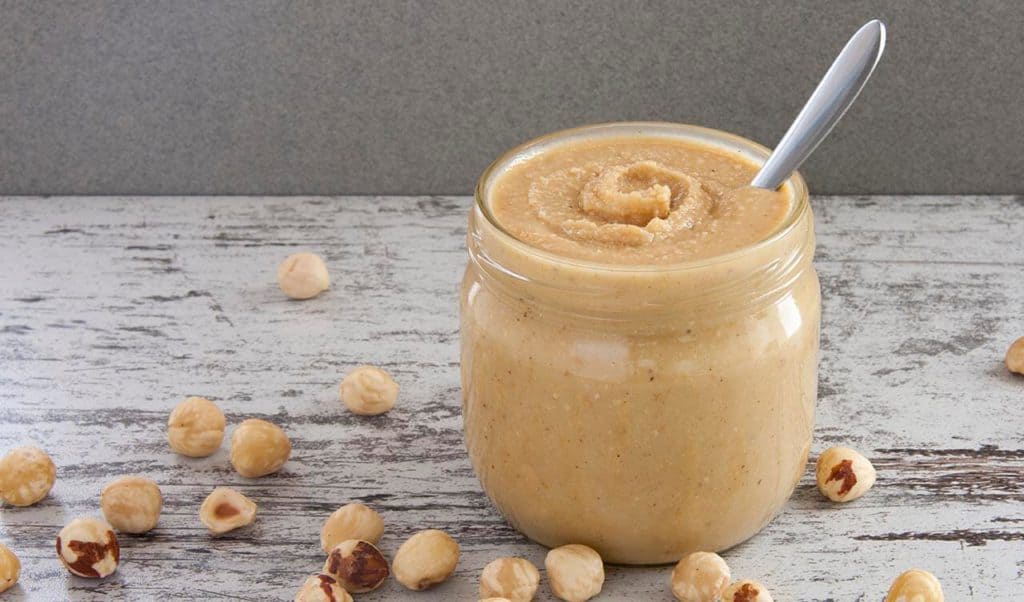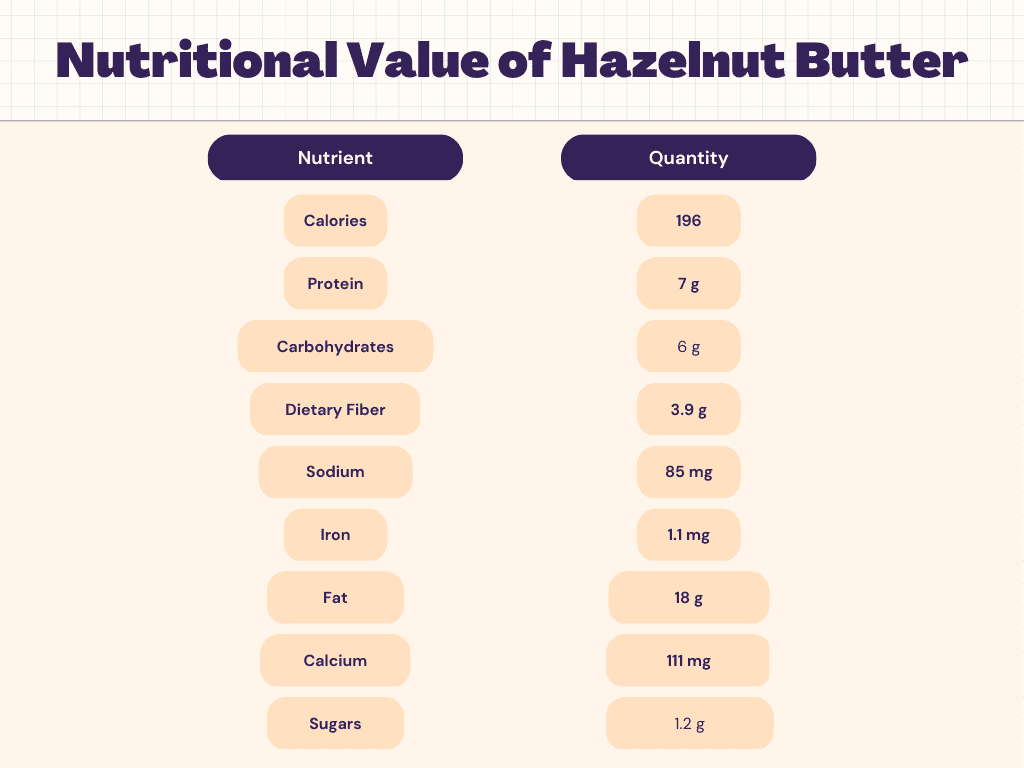Hazelnut butter, also known as hazelnut spread or Nutella, is a popular nut-based spread that has gained widespread popularity over the years. This creamy and delicious spread is not only a great alternative to traditional peanut butter but is also a great source of nutrition. Hazelnut butter is rich in healthy fats, protein, and fiber, making it a great addition to a balanced diet. In this article, we will delve into the nutritional value of hazelnut butter, including its calorie content, protein, and carbohydrate composition, to help you make informed dietary choices.
Nutritional Value Of Hazelnut Butter
Nutritional Facts of Hazelnut Butter
Carbs In Hazelnut Butter
Hazelnut butter typically contains some carbohydrates, but the exact amount can vary depending on the specific brand and recipe. Generally, a 2-tablespoon serving of hazelnut butter contains around 6-8 grams of carbohydrates. However, it’s important to note that not all carbohydrates are created equal, and some hazelnut butter may contain added sugars or other ingredients that can significantly increase the carb content. If you are closely monitoring your carbohydrate intake, be sure to check the nutrition label of the hazelnut butter you’re considering and factor in any additional ingredients or serving sizes.
Protein In Hazelnut Butter
Hazelnut butter is a good source of protein, which is an essential nutrient required for building and repairing tissues in the body. A 2-tablespoon serving of hazelnut butter typically contains around 3-4 grams of protein. While this may not seem like a significant amount, it can still contribute to your daily protein requirements, especially when combined with other protein-rich foods. Hazelnut butter is also a good option for those following a vegetarian or vegan diet, as it provides a plant-based source of protein. However, it’s important to keep in mind that hazelnut butter is not a complete source of protein, meaning it does not contain all of the essential amino acids needed by the body. To ensure you are meeting your protein needs, be sure to consume a variety of protein sources as part of a balanced diet.
Health Benefits Of Hazelnut Butter
Hazelnut butter may provide some potential health benefits for individuals with PCOS, thyroid disorders, and diabetes, and those looking to manage their weight. Here are some of the ways in which hazelnut butter may be beneficial:
- PCOS: Hazelnut butter is a good source of healthy fats and protein, which can help regulate blood sugar levels and improve insulin sensitivity, potentially benefiting those with PCOS who often struggle with insulin resistance. Check our PCOS Plans here.
- Thyroid disorders: Hazelnut butter contains selenium, which is essential for thyroid function. Consuming hazelnut butter as part of a balanced diet may help individuals with thyroid disorders ensure they are getting sufficient selenium in their diet. Check our Thyroid Plans here.
- Diabetes: Hazelnut butter is a low-carb, high-protein food that may help regulate blood sugar levels, making it a good option for individuals with diabetes who need to monitor their carbohydrate intake. Check our Diabetes Plans here.
- Weight loss: Hazelnut butter is a high-fat food, but the majority of the fats it contains are healthy fats that can help increase feelings of fullness and reduce cravings. This may make it easier for those looking to manage their weight to stick to a calorie-controlled diet. Check our Weight Loss Plans here.
It’s important to note that while hazelnut butter may be beneficial, it should be consumed in moderation as part of a balanced diet, and individuals with specific health concerns should consult with a healthcare provider to determine the best approach for their individual needs.
Vitamins & Minerals in Hazelnut Butter
Hazelnut butter is a good source of vitamins and minerals, which are essential nutrients that play a vital role in maintaining optimal health. Here are some of the key vitamins and minerals found in hazelnut butter:
- Vitamin E: Hazelnut butter is a rich source of vitamin E, a powerful antioxidant that helps protect the body against cellular damage and may help reduce the risk of chronic diseases.
- Magnesium: Hazelnut butter is also a good source of magnesium, an essential mineral that plays a role in over 300 biochemical reactions in the body, including muscle and nerve function, blood sugar control, and blood pressure regulation.
- Copper: Hazelnut butter contains copper, a mineral that helps the body produce red blood cells and maintain healthy bones, nerves, and immune function.
- Manganese: Hazelnut butter is a good source of manganese, a mineral that is important for healthy bone development, wound healing, and metabolism.
- Iron: Hazelnut butter contains iron, which is important for the production of red blood cells and the transport of oxygen throughout the body.
It’s important to note that the specific nutrient content of hazelnut butter may vary depending on the brand and preparation method, so it’s a good idea to check the nutrition label for the specific vitamins and minerals contained in the hazelnut butter you are consuming.
The Bottom Line
Hazelnut butter is a nutrient-dense spread that offers a range of potential health benefits. It is a good source of vitamins and minerals such as vitamin E, magnesium, calcium, iron, and potassium, while hazelnut butter is a rich source of vitamin E, magnesium, copper, manganese, and iron. Both it is also high in healthy fats, protein, and fiber, which can help regulate blood sugar levels, reduce LDL cholesterol levels, and promote feelings of fullness. Consuming Hazelnut butter in moderation as part of a healthy diet may provide a range of potential health benefits for overall health and well-being.
Faqs
How much Hazelnut Butter can I eat in a day?
The amount of hazelnut butter you can eat in a day depends on your individual dietary needs and goals, as well as your overall calorie intake. Hazelnut butter is a nutrient-dense food that is high in calories, so it’s important to consume it in moderation as part of a balanced diet.
A typical serving size of hazelnut butter is around 2 tablespoons (32 grams), which contains approximately 200-220 calories. Depending on your individual calorie needs, you may be able to consume more or less than this amount.
It’s worth noting that while hazelnut butter is a healthy food, it’s still high in fat and calories, so it’s important to keep track of your overall calorie intake and consume it in moderation.
Should I eat Hazelnut Butter before or after exercise?
It’s generally recommended to eat hazelnut butter after exercise as part of your post-workout meal or snack. This can help replenish energy stores and aid in muscle recovery. However, if you need a quick source of energy before your workout, a small amount of hazelnut butter can also be consumed beforehand.
What are the benefits of Hazelnut Butter?
Hazelnut butter can have several benefits, including:
- Rich in nutrients: Hazelnut butter is a good source of nutrients like protein, fiber, healthy fats, vitamin E, and minerals like magnesium, copper, and manganese.
- May improve heart health: The healthy fats in hazelnut butter can help lower cholesterol levels and reduce the risk of heart disease.
- May aid in weight management: The protein and fiber in hazelnut butter can help you feel full and satisfied, which may reduce the likelihood of overeating.
- May improve brain function: Hazelnuts are a good source of vitamin E, which has been linked to better cognitive function and a lower risk of cognitive decline.
- Versatile and delicious: Hazelnut butter can be used in a variety of ways, such as in smoothies, on toast, or as a dip for fruit or vegetables, and it has a rich and nutty flavor that many people enjoy.
What is the best time to eat Hazelnut Butter?
There’s no specific “best” time to eat hazelnut butter, as it can be a nutritious addition to a balanced diet at any time of day. However, it can be particularly beneficial to include hazelnut butter as part of a post-workout meal or snack, as the healthy fats, protein, and other nutrients can help with muscle recovery and replenishing energy stores. Hazelnut butter can also be a satisfying addition to breakfast, as it can help you feel full and satisfied throughout the morning. Ultimately, the best time to eat hazelnut butter is whenever it fits into your overall dietary goals and preferences.










